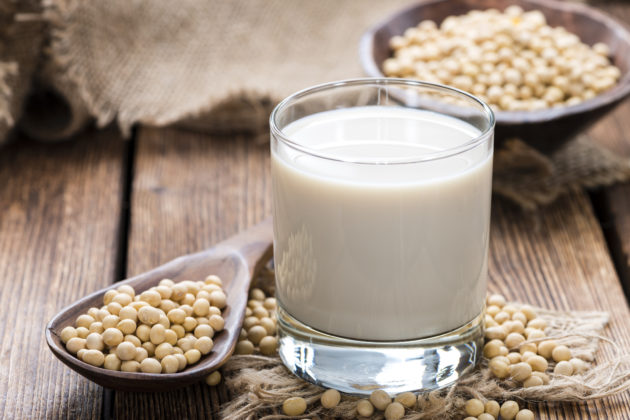
Study finds soy may be most nutritious milk replacement beverage
Food in Canada
Food In Canada Food Trends Processing Research & Development Beverages Dairy almond coconut cow's milk dairy McGill University rice soyA McGill University study examined several plant-based milk beverages to compare nutritional values and found after cow's milk, soy comes out on top
 Glass with Soy Milk and Seeds on wooden background
Glass with Soy Milk and Seeds on wooden background Montreal – A study from McGill University has found that after cow’s milk, soy milk is the most nutritious.
The university released the results on its website in a story titled “Nutritionally speaking, soy milk is best plant-based milk” which it published on Jan. 29, 2018.
The study, which was published in the Journal of Food Science Technology is called How well do plant-based alternatives fare nutritionally compared to cow’s milk?
According to the online article, there hasn’t been much research done to look at “the benefits and drawbacks of the various kinds of plant-based milks.
McGill’s study took a look at four types of milk beverages from plant sources such as almond, soy, rice and coconut, and then compared their nutritional values to cow’s milk. In all cases, the university looked at the unsweetened versions of each of the plant-based milks.
What they found was that soy had the “most balanced nutritional profile.”
Here is a breakdown of each of the beverages as found in the article:
Soy milk – the most balanced nutritional profile
· Soy milk is widely consumed for its health benefits linked to the anti-carcinogenic properties of phytonutrients present in the milk known as isoflavones.
· Has been a substitute for cow’s milk for four decades.
· Concerns, however, are the “beany flavour” and the presence of anti-nutrients (substances that reduce nutrient intake and digestion).
Rice milk – sweet taste and little nutrition
· Lactose-free and can act as an alternative for patients with allergy issues caused by soybeans and almonds.
· Concerns, apart from the high carbohydrate count, is that consumption of rice milk without proper care can result in malnutrition, especially in infants.
Coconut milk – no protein and few calories, but most of them from fat
· Widely consumed in Asia and South America.
· Consumption can help reduce levels of harmful low-density lipoproteins (bad cholesterol) that are associated with cardiovascular diseases.
· Nutritional values are reduced if stored for over two months.
Almond milk – need for complementary sources of food to provide essential nutrients
· Almonds have a high content of monounsaturated fatty acids (MUFA) that are considered helpful in weight loss and weight management. MUFA also helps in reduction of low-density lipoprotein (bad cholesterol).
For more on the study, click here.
Print this page